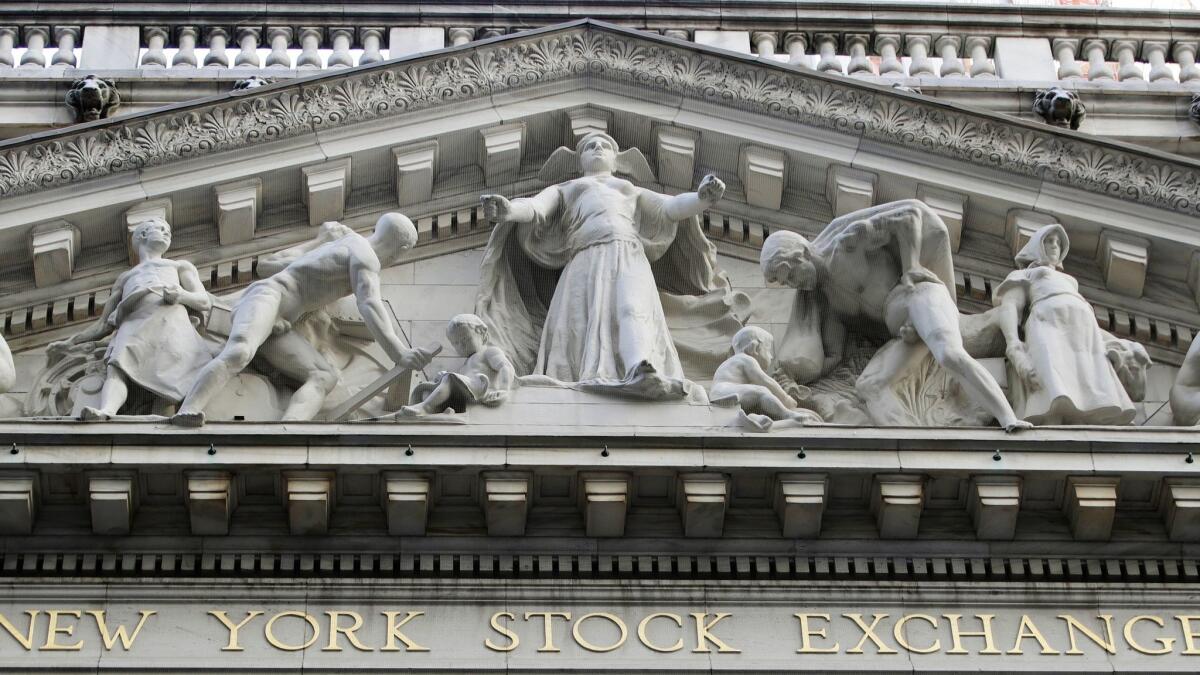Johnson & Johnson and Goldman Sachs sneeze, and stocks catch a cold

- Share via
U .S. stocks fell Tuesday after weak first-quarter reports from Johnson & Johnson and Goldman Sachs frustrated investors who hope that company earnings are on the rise. Healthcare companies lost the most.
Wall Street has high hopes for company earnings this spring, and weak results from the world’s largest healthcare products company and one of the biggest financial firms had them worried. Johnson & Johnson had its biggest one-day drop in a year. Investors also looked for safety after the British government called for a surprise early election next month. Bond prices and the pound rose, and European stock indexes tumbled.
Kate Warne, an investment strategist for Edward Jones, said Goldman Sachs and Johnson & Johnson had a dramatic effect on stocks because investors expect a very strong round of company earnings reports this month. According to S&P Global Markets Intelligence, investors expect first-quarter earnings for S&P 500 companies to rise almost 10% compared with last year. That would be the biggest jump since 2014.
“The reason it’s so important is that the stronger growth is likely to support higher stock prices even in the absence of pro-growth policies from the Trump administration,” Warne said.
The Standard & Poor’s 500 index fell 6.82 points, or 0.3%, to 2,342.19. The Dow Jones industrial average slid 113.64 points, or 0.6%, to 20,523.28. Goldman Sachs was responsible for most of that loss.
The Nasdaq composite edged down 7.32 points, or 0.1%, to 5,849.47. The Russell 2000 index of small-company stocks recovered from an early loss and rose 0.71 of a point, nearly 0.1%, to 1,361.89.
On Monday, stocks made their biggest gain in six weeks. But over the last few weeks they’ve mostly drifted down while bond yields have fallen to five-month lows.
Johnson & Johnson — which makes Tylenol and Band-Aids — slid 3.1% to $121.82 after investors were disappointed with its sales. Revenue from its biggest-selling drug, the Crohn’s disease treatment Remicade, fell 6%. Meanwhile, growth for many consumer health products slowed, and payers demanded bigger rebates on treatments for cardiovascular ailments and diabetes and primary-care products.
Prescription drug distributor Cardinal Health sank 11.5% to $72.39 after it gave weak profit forecasts for this year and next as drug prices continue to fall. It also said it will pay $6.1 billion to buy a group of businesses from medical device maker Medtronic. Cardinal competitors AmerisourceBergen and McKesson each fell about 5%.
Goldman Sachs’ revenue fell short of investor projections in the first quarter as its highly regarded trading desks didn’t perform as well as their competitors. Its shares declined 4.7% to $215.59, their biggest drop since June. The stock reached all-time highs above $250 a share in March.
British Prime Minister Theresa May reversed her position by calling for an early general election in June. May formally triggered Britain’s exit from the European Union last month, and she intends to seek a stronger parliamentary mandate. The pound climbed after May’s announcement on the hope that the election will result in May getting a better deal for Britain in its talks with the EU. It rose to $1.2848 from $1.2563.
European stocks fell, as the vote creates even more political uncertainty in Europe days before the first round of French presidential voting. Polls don’t give a clear edge to any of the four leading candidates ahead of Sunday’s vote. The top two will advance to a May 7 runoff, and investors are unsettled by the chance that a far-left or far-right candidate could pull off a victory. Britain’s FTSE 100 dropped 2.5% and France’s CAC 40 lost 1.6%. In Germany the DAX shed 0.9%.
As investors snapped up government bonds, the bonds’ prices jumped. The yield on the 10-year Treasury note fell to 2.18%, its lowest since Nov. 11, from Monday’s 2.25%.
Investors also bought shares of companies that pay big dividends. Household goods makers such as Kraft Heinz and Molson Coors, along with utilities, real estate investment trusts and phone companies, finished higher.
Netflix sagged 2.6% to $143.36 after the streaming video company said it didn’t gain as many subscribers in the first quarter as investors hoped. Its second-quarter profit guidance also fell short of analyst estimates.
Read more: Netflix beats earnings estimates, but slowdown in subscribers hits stock »
U.S. crude oil futures fell 24 cents to $52.41 a barrel in New York. Brent crude, used to price international oils, fell 47 cents to $54.89 a barrel in London.
Wholesale gasoline fell 1 cent to $1.71 a gallon. Heating oil fell 1 cent to $1.62 a gallon. Natural gas fell 2 cents to $3.15 per 1,000 cubic feet.
Gold rose $2.20 to $1,294.10 an ounce. Silver fell 24 cents, or 1.3%, to $18.27 an ounce. Copper fell 7 cents, or 2.6%, to $2.53 a pound.
The dollar fell to 108.42 yen from 108.59 yen. The euro rose to $1.0730 from $1.0642.
The benchmark Nikkei 225 index in Japan added 0.4% while South Korea’s Kospi edged up 0.1%. The Hang Seng of Hong Kong shed 1.4%.
ALSO
This company is trying to draw Chinese tourists to L.A. — with VR technology
Column: Revised GOP bill would destroy the Consumer Financial Protection Bureau
L.A. venture capitalists who missed Snapchat don’t want to make the same mistake twice
UPDATES:
2:40 p.m.: This article was updated with closing prices, context and analyst comment.
8:10 a.m.: This article was updated with market prices and context.
This article was originally published at 6:45 a.m.
More to Read
Inside the business of entertainment
The Wide Shot brings you news, analysis and insights on everything from streaming wars to production — and what it all means for the future.
You may occasionally receive promotional content from the Los Angeles Times.










